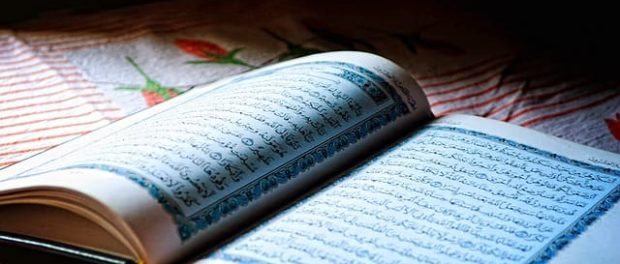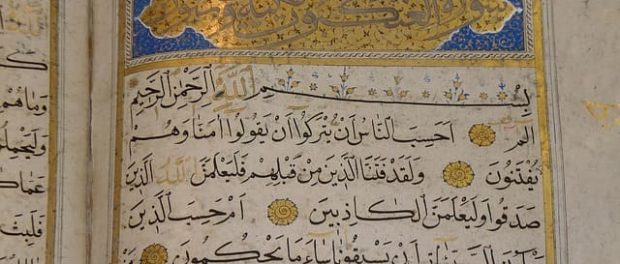The Quran is the holy book of Islam, of Muslims, it is like the bible for Catholics. The book contains all the principles and teachings that Allah, through the Prophet Muhammad, tells Muslims to follow.
See more about the islam here
Quran Meaning
The Arabic word Al-Qur’an literally means recitation. Used in the context of Islam, the word Quran can have the following meaning: To be God’s last message to mankind revealed to the Prophet Muhammad. In fact, the Koran is the word of God and serves as a guide for human beings.
Sura 5, verse 16 “With this (the Qur’an), God guides those who seek their pleasure on the path of salvation, and brings them out of the darkness into the light by his grace, and guides them on a straight path.”
This work has been perfectly preserved both in terms of form and meaning, and in a language that is still practiced today, Arabic. The Quran is a living miracle, the supreme miracle, remains inimitable in its spiritual style, form and impact.
Beginnings of the Quran
The Quran was revealed to the Prophet Muhammad (Muhammad), over a period of 23 years. In this book it is embodied, and has always been seen as the word of God by those who believe in Allah. This work was during his revelation preached and recited in public, both in front of Muslims and people who were not of the Muslim faith, Jews, Christians, polytheists, atheists, among others.
In addition, the Quran was written completely during the life of the prophet. Several supports have been used for its creation bones, skin, fabric, among others. It was only after the arrival of the third Caliph ‘Uthman (approved by God) that it was completely compiled to form a true book. Many of the Prophet’s companions memorized it word by word, as it was revealed, and even today, thousands of believers know it by heart and are its guardians, Hafiz-al-Qur’an.
The Quran is a universal script, aimed at all mankind and not at an elected people or a tribe. The message it brings is essentially the same as the one revealed to other prophets of Islam. Everyone rests on the phrase that there is only one God, which is Allah. This message, of course, is presented in the Koran, as well as in various aspects of life, such as the rules of life, scientific facts, the history of many prophets, among others. The whole book is written in an inimitable style, for all those who yearn for knowledge, and the truth, the Quran is the guide par excellence.
What is the Quran?
Specialists define the Quran as the word of Allah that revealed his last prophet Mohamed (saw), transmitted through the path of At-Tawatur, whose recitation is an act of worship and the shortest recitation is a challenge. It is inscribed between the two covers of the Moushaf (collection) of Surah El Fatiha in Surah Annas (114 Surahs).
This definition requires some explanation, therefore, the word of Allah, the Quran is not the word of an angel or a man, but the word of God Himself. This word is transmitted by God to his messenger and servant Mohamed (saw) through the angel Gabriel (Jebril).
What is it about?
The Quran proposes a mirror image between this World and the Other World and an opposite approach to Paradise and Hell. The stated purpose of this Quranic discourse is to incite the believer, in the name of his faith, to apply as much as possible the realization of “good” and to avoid, to the extent of his ability, to commit evil, because God requires a soul only in agreement with its capacity.
In addition, although the exegetic doxa wanted the existence of an intermediate state taken from purgatory from Christianity, it is clear that, according to the Qur’an, this escape is only a theological fiction, that God did not promise man as the next alternative, paradise or hell.
The Quran describes paradise according to three levels of understanding, concrete, allegorical, and spiritual. The opposite between paradise and hell presupposes, a priori, that the same dialectical complexity with respect to hell is found.
With respect to paradise, the Qur’an states that life here below is only a brief stage whose purpose is beyond our reality that paradise or hell has a double aspect. The Koran over hell describes it as the “becoming of hate,” the hell in the Koran has many Quranic qualifiers, such as fire, furnace, torment, Gehenna, among others.
Paradise has the character of universality according to the Qur’an, which was promised to all believers to act well, whatever their religion. However, it is well established in Quranic theology that access to paradise is based on two criteria, believing and acting in good. Therefore, an equivalent is expected to be in opposition to hell that is then reserved, on the one hand, to the deniers and, on the other hand, to all those who have acted badly.
Beginnings of the Quran
The Arabic word قرآن, qor’ān, derives from the root قرا, qara’a, which means “read, recite”. The word Qor’ān, which is an action name, means “reading,” “recitation.” According to experts, the occurrences of the term “Quran” in the Quran cannot refer to the book as a fixed set.
At the end of the year thousand, the comments on the Quran were diverse, in relation to a great intellectual effervescence. In particular, a reformist school proposed to distinguish the uncreated Quran, the word of God, with the God that has not been able to match and the created Quran, the same that came out of Muhammad’s mouth and must be analyzed and interpreted.
Today, in light of the work done in Christian texts, researchers approach the study of the Quran with a historical, archaeological and philological view.
According to Muslim tradition, at the death of Muhammad in 632 CE, there was no complete and definitive edition of the revelations pronounced by the Prophet. Numerous Arab-Muslim sources attest to this. It is said that his Companions had memorized it, learning it and reciting it by heart. Some, however, had been transcribed in various materials, such as palm leaves or camel shoulder blades.
A first “complete” writing would have been made at the request of Omar, who feared that the Quran would disappear because its memorizers died in battle. He persuaded Caliph Abu Bakr (632-634) to have written records of what people knew and what had been written about various materials. This collection work was directed by one of Muhammad’s scribes, Zaid b. Thabit.
At the death of Abu Bakr, these first pages of the Koran were transmitted to Omar, who became a caliph (634-644), and to his daughter Hafsa, one of Muhammad’s widows.
It was under the following caliphate, that of Othman (644-656), that the differences in the way of reciting the Koran are shown. Othman took over the corpus held by Hafsa and was completed by other characters, still under the
direction of Zaïd b. Thabit
He then destroyed all the original materials, imposed a first “canonical” version of the Qur’an by addressing the most important cities of the young Empire. However, the Muslim tradition states that the very idea of the collection had encountered oppositions, including that of Ibn Mas’ûd, companion of the Prophet (633), and that, on the other hand, in history there are many contradictions in the collection of Quran who defy this claim.
Why is the Koran important?
As it is constituted today, the Quran is a relatively small volume. If checked, it is noted that it is a set of fragments. This set is divided into 114 units, which are called “suras”, very compound, and without any apparent logical or chronological link between them. They are more or less long texts, whose style and contents are very varied. When a sura is very short, it constitutes a literary unit, but as the suras become long, they become more composed.
The Quran often raises from a rant against infidels to recipes on dietary prohibitions. Sometimes it is the Prophet Muhammad who speaks, but under the appearance of God and under his command “Say”, very often, it is God who speaks, with the “We” of majesty.
The same name of Muhammad appears there only four times, to affirm that he is the Messenger of God. What can be interpreted as an evocation of his purely allusive personal life, sometimes juxtaposed with issues unrelated to him.
The name of Mecca appears only once or twice. The name of Yathrib, the town where Mohammed was established at the time of the Hegira, the future Medina, appears only once, and that of “Al-Madina” four times, without explicitly indicating that it is medina. These simple observations tell us that the Quran is not a history book.
The Quran contains the messages that Muhammad, the prophet of Islam, received from God through a divine messenger, Gabriel, during his career in Arabia, Mecca and Medina. Gabriel is a well-known figure, rather an angel of the power of God in the Jewish comments of the Bible, for example in the Talmud, he is a messenger of God sent to Zechariah and Mary in the Christian tradition. Therefore, the Quran is important for Muslims as a book of reflection and follow-up of their doctrine and faith.


